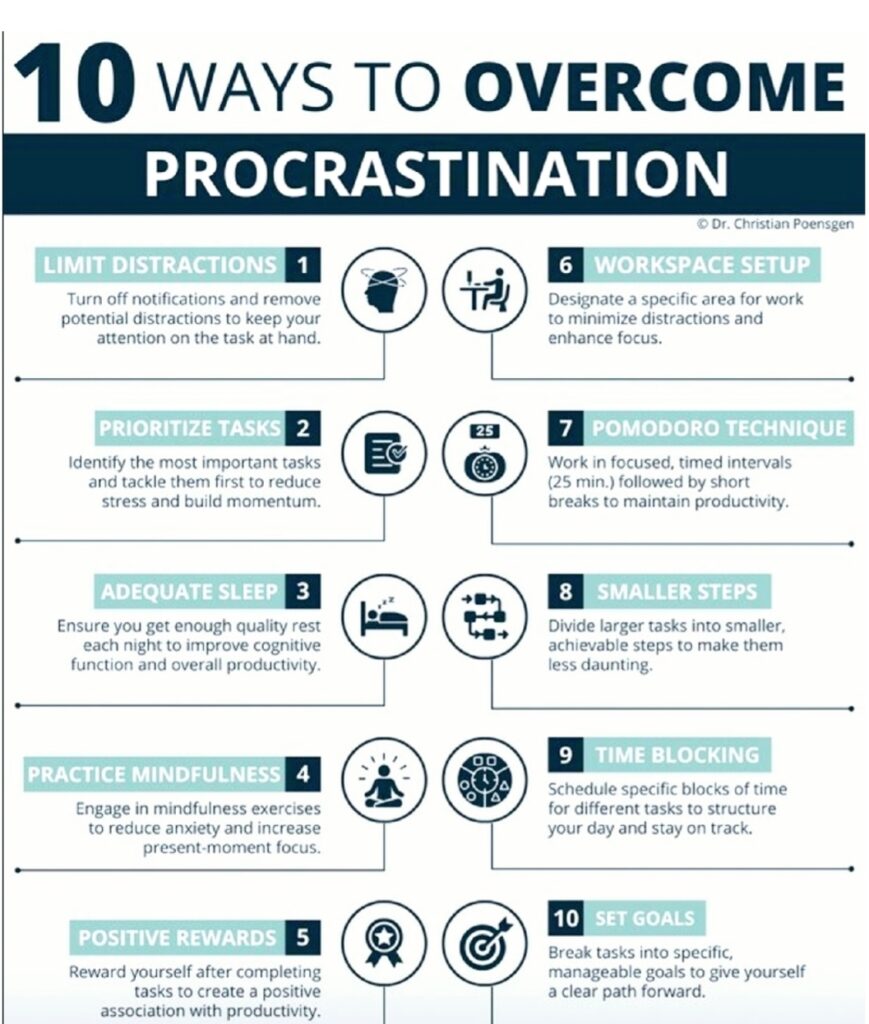Procrastination is a challenge that affects a lot of people, and it’s something many of us struggle with at one point or another. According to the American Psychological Association, around 20% of adults deal with chronic procrastination, which can seriously affect productivity and lead to stress and anxiety. For some, like those with ADHD, depression, or anxiety, it can be even harder to focus and get things done. In this post, we’ll look at 10 practical strategies you can use to fight procrastination and become more productive.
- Limit Distractions: Distractions are a huge reason we procrastinate. Whether it’s social media, texts, or notifications, it’s easy to get sidetracked. Try using apps like Freedom or Forest to block these distractions to stay focused. For example, if you need to write a report, turn off your phone, close unnecessary tabs, and get rid of anything that might pull your attention away. A distraction-free space will help you concentrate and get into work mode.
- Prioritize Tasks: Having a lot of tasks to do can be overwhelming, but prioritizing them helps you figure out where to start. Focus on the most urgent or important tasks first. A tool like the Eisenhower Matrix can help with this, where you rank tasks based on urgency and importance. If you’re a student with an upcoming exam and several assignments, tackle the most pressing tasks first, so you’re not cramming at the last minute.
- Get Adequate Sleep: It’s easy to overlook sleep when trying to be productive, but getting enough rest is crucial. Poor sleep affects your focus and memory, which makes it harder to get things done. For example, staying up late working on a project might leave you feeling drained the next day. Aim for 7-9 hours of sleep to help you stay sharp and energized throughout the day.
- Practice Mindfulness: Mindfulness exercises like meditation or deep breathing can help reduce anxiety and keep you focused. This is especially helpful for people with ADHD, as it helps train your mind to stay on task. Before starting a big project, breathe deeply and clear your head for five minutes. This simple practice can make it easier to concentrate and get to work.
- Reward Yourself with Positive Reinforcement: Sometimes, procrastination happens because tasks feel like chores. One way to combat this is by rewarding yourself after completing a task. For instance, after finishing a report, treat yourself to a snack or a short break to watch a video. This positive reinforcement makes work feel more rewarding and can motivate you to keep going.
- Set Up Your Workspace: Your environment plays a big role in your ability to focus. A cluttered or distracting workspace can make procrastination worse. Try setting up a dedicated workspace that’s clean and organized. If you work from home, consider creating a specific area just for work, with everything you need within reach. This signals to your brain that it’s time to focus.
- Use the Pomodoro Technique: The Pomodoro Technique is a time-management method where you work in short bursts followed by brief breaks. For example, work for 25 minutes, then take a 5-minute break. This keeps your mind fresh and prevents burnout. If you’re studying for an exam, set a timer for 25 minutes of focused work, then take a quick break to recharge.
- Break Tasks into Smaller Steps: Big tasks can seem overwhelming, but breaking them into smaller, manageable steps makes them feel more achievable. For example, if you need to write a research paper, start by dividing it into smaller tasks like selecting a topic, researching sources, creating an outline, and writing each section. Focusing on one small task at a time makes it easier to stay on track and feel a sense of progress.
- Time Blocking: Time blocking is when you schedule specific blocks of time for different tasks throughout the day. This helps structure your day and keeps you on track. For example, you might block out an hour in the morning for emails, two hours for project work, and another hour for meetings. Many successful people use time blocking to stay productive and avoid procrastination.
- Set Clear Goals: Having clear, focused goals helps you stay focused and reduces procrastination. When your goals are vague, you easily feel lost or unmotivated. Break down bigger tasks into smaller, clear goals. For example, instead of just aiming to “finish a report,” set a goal to “complete the introduction by noon” or “review the data by 3 PM.” This gives you a clear path forward and a sense of achievement as you check off each goal.

Best Ways to Overcome Procrastination
Getting through procrastination isn’t just about willpower; it’s about finding the right habits and routines that work for you. Here are a few tips to help you keep moving forward:
Keep Track of Your Progress: Use a journal or an app to keep tabs on your habits. This can help you see where you’re making headway and spot areas to improve.
Accountability: Discuss your goals with a friend or colleague who can check in with you. A little outside support can go a long way.
Give Yourself Some Grace: Procrastination is something almost everyone deals with, and it’s okay if you’re not perfect. Real progress is a gradual process.
Adding these strategies into your routine should help you develop good habits that lessen procrastination and boost productivity. So, if you’re dealing with ADHD, anxiety, or working toward having a better focus, these steps can help you take on tasks with more ease. Also, with patience and the right routine, you’ll find that it’s possible to build a more productive and satisfying routine.

